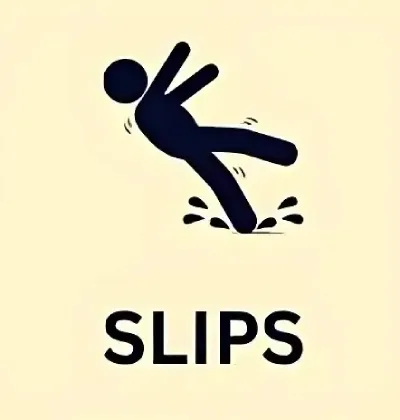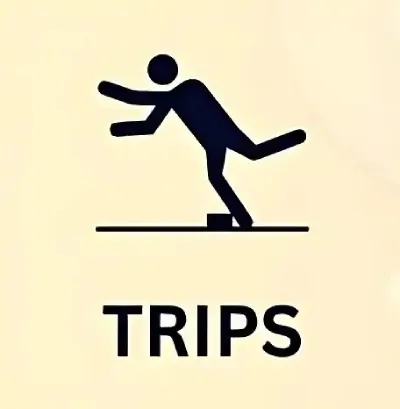Examples from Security Workplaces
Understanding Fall in the Workplace
As a security officer, you’re rarely standing still. You move between lobbies, stairwells, warehouses, car parks, and construction sites — often in all kinds of weather, at all times of the day and night. With so much ground to cover, you’re exposed to hazards most people don’t even notice.
That’s why slips, trips, and falls aren’t “just accidents” in this line of work — they’re everyday risks that can strike when you least expect it. The polished hotel floor after rain, the forgotten box in a warehouse walkway, or the uneven ground on a night patrol… each of these can put you, colleagues, or members of the public in danger.
The good news? These accidents are also predictable and preventable. With vigilance, quick decisions, and professional standards, you can stop them before they happen.
Example 1: Slip in a Hotel Lobby
What it means: A slip happens when there isn’t enough grip between your footwear and the floor.
Scenario: You’re patrolling a hotel lobby on a rainy evening. Guests track in water, creating slick patches on the polished marble floor near the lifts.
Hazard: Smooth flooring + water = high slip risk.
Action: Place a wet floor sign, radio cleaning staff, and monitor the area until it’s safe.
Consequence if ignored: A guest or officer slips, leading to injuries, claims, and reputational damage to the hotel and the security team.

Tip: Always scan polished or tiled areas after rain — even small puddles can put multiple people at risk.
Example 2: Trip in a Warehouse Patrol
What it means: A trip happens when your foot strikes an obstacle or uneven surface and throws you off balance.
Scenario: During a night patrol in a distribution warehouse, you find shrink-wrap and packaging left in a walkway. Forklifts are operating close by.
Hazard: Cluttered flooring + moving vehicles = serious accident potential.
Action: Remove the debris immediately, report poor housekeeping, and ensure walkways are clear.
Consequence if ignored: An officer or worker trips into the path of machinery — triggering HSE investigations and possible contract loss.

Tip: Good housekeeping is one of the strongest defences against trip hazards. Treat clutter as a red flag.
Example 3: Fall on a Construction Site
What it means: A fall is when someone loses balance completely — often from height, but also at ground level.
Scenario: On overnight duty at a construction site, you cut across uneven ground where lighting is poor. You stumble over loose materials and fall heavily.
Hazard: Uneven surfaces + poor lighting = high fall risk.
Action: Stick to designated paths, use a torch, and escalate lighting issues to site management.
Consequence if ignored: A serious injury for you — plus HSE enforcement action if safe access routes weren’t maintained.

Tip: Never “short-cut” across unlit or uneven areas. If it feels unsafe for you, it’s unsafe for contractors and the public.
The Science Behind Slips, Trips, and Falls
It may feel like “bad luck”, but these incidents have predictable causes:
Slips happen when there’s not enough friction between floor and footwear.
Trips occur when the foot hits an obstacle and momentum carries you forward.
Falls happen when balance is completely lost — often triggered by a slip or trip.
Key Point: Because they are predictable, they are also preventable.
Spot the Hazard: Shopping Centre Scenario
Scenario: You’re patrolling a shopping centre entrance on a wet winter’s day. In 20 seconds you notice:
Wet tiles with no mat.
A trailing cable from a kiosk.
An escalator being used by children running.
Question: Which hazard do you tackle first?
Answer: All matter, but the wet tiles are the most urgent, as dozens of shoppers are at risk at once.
Teamwork Matters
Preventing accidents isn’t just your job alone — it’s a team effort:
Communicate clearly: Use your radio to alert others.
Support cleaners and contractors: Check signs are in place.
Lead by example: When you act on hazards, others take them seriously too.
Remember: Safety is contagious. Your actions influence your colleagues.
Why These Examples Matter
Slips come from poor grip between floor and footwear.
Trips come from obstacles or uneven ground.
Falls are the result of losing balance entirely — often linked to slips or trips.
For security officers, the common thread is vigilance. Each hazard spotted and acted on shows compliance with HSE duties, SIA professionalism, and the high standards expected under BSI and NSI guidance.
Remember: Quick Reference
| Type | Think Of | Action to Take |
|---|---|---|
| Slips | Surfaces | Keep floors dry and wear footwear with good grip. |
| Trips | Obstacles | Keep walkways clear and free from clutter. |
| Falls | Balance | Use handrails, light your path, and move with control. |
Key Message: Every hazard you deal with is more than prevention — it’s proof of your professionalism.

